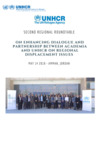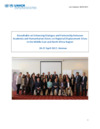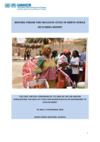Ethiopia: Somali refugees to be relocated away from border
This is a summary of what was said by UNHCR spokesperson Jennifer Pagonis – to whom quoted text may be attributed – at today's press briefing at the Palais des Nations in Geneva.
In Ethiopia today (Friday), UNHCR teams are expected to start relocating a group of 500 newly-recognized Somali refugees who fled from renewed conflict in strife-torn south and central Somalia over the last year. They have been staying around the Kebribeyah area, near the Somali border in eastern Ethiopia and are being relocated to a re-opened UNHCR camp at Teferi Ber.
The refugees are part of a group of 4,000 Somali refugees who have recently been granted refugee status by UNHCR and the government's Authority for Refugees and Returnees Affairs (ARRA). An estimated 7,000 additional Somalis who also claim to have fled fighting and insecurity in Somalia, are waiting to be screened at other sites in eastern Ethiopia.
The new camp site at Teferi Ber, some 120 km north of Kebribeyah, was formerly a UNHCR camp which in the 1990s hosted some 49,000 mainly Somalis refugees who had fled fighting in their country. The camp was officially closed in 2001 after all the refugees returned, mainly to the self -declared republic of Somaliland.
After arriving at Teferi Ber, the refugees will spend three days in a reception centre where they will be allocated plots of land to construct homes and given building materials. They will also be given food as well as tarpaulins, blankets, sleeping mats, kitchen sets, jerry cans, kerosene stoves, and soap. The ARRA has established a temporary health centre until permanent structures can be built.
The Somali Region of Ethiopia already hosts more than 16,500 refugees. With the new arrivals, the total is 20,300. At the peak of the Somali refugee crisis in the early 90s, the region hosted 628,000 refugees in eight camps. The overwhelming majority went home between 1997 and 2005, and all of the camps were closed except a camp at Kebribeyah.
Related news and stories
Thousands of newly arrived Somali refugees in Ethiopia relocated to new settlement
Samira's Story
Drought brings life-threatening food shortages for refugees in Ethiopia
100,000 new Somali refugees arrive in Ethiopia in the past month, UN and partners are calling for urgent funding
UNHCR teams and partners rush assistance to some 100,000 newly arrived Somali refugees in hard-to-reach area of Ethiopia
As the Horn of Africa drought enters a sixth failed rainy season, UNHCR calls for urgent assistance
-

Regional Roundtable on the Role of Faith-Based Organizations in Addressing Displacement in MENA
7 Dec 2021 The purpose of the meeting was to explore the role of religion in promoting universal understanding and respect of human dignity, and faith-based responsibility towards displaced people and refugees. The main goal of the roundtable was to formulate commitments or pledges from religious actors in the region to refugees at a time of heightened tensions in some places towards the GRF. -

Second Regional Roundtable On Enhancing Dialogue and Partnership Between Academia and UNHCR on Regional Displacement Issues
7 Dec 2021 The second regional academia roundtable, co-hosted by UNHCR, the WANA Institute and the Columbia Global Center | Amman saw the participation of over 40 participants from various think tanks, academic institutions and research centers from across the MENA region. This gathering provided a platform for academia to frame its role in influencing policy, programs and discourse related to displacement in the MENA region in the context of major global processes including the Global Compact on Refugees (GCR) and the Comprehensive Refugee Response Framework (CRRF). -

Roundtable on Enhancing Dialogue and Partnership between Academia and Humanitarian Actors on Regional Displacement Crises in the Middle East and North Africa Region
7 Dec 2021 Organized by the UNHCR MENA Policy Unit, in partnership with the West Asia-North Africa (WANA) Institute, the first of its kind regional roundtable for academia brought together academics, think tanks, research centers, and university professors from 12 countries to discuss their role in humanitarian interventions. The discussions brought to light challenges that academia faces, and generated concrete suggestions and good practices in relation to solutions. -

The First MENA Roundtable on the Role of Art and Culture in Addressing Displacement
7 Dec 2021 The roundtable was the first of its kind in the region and aimed to discuss how artists and cultural actors can shape public narratives and expand the space for constructive dialogues, particularly in relation to social cohesion between refugees and host communities. The roundtable provided a platform for over 50 artists and cultural actors to frame their role in issues related to displacement in MENA and share successful practices of promoting refugee inclusion. -

Mayors Forum for Inclusive Cities in North Africa Outcomes Report
7 Dec 2021 The Mayor's Forum for Inclusive Cities in North Africa brought together mayors, municipality authorities and civil society organisation representatives from major refugee hosting cities in Egypt, Morocco, Algeria, Libya, Tunisia and Mauritania. The forum was hosted by UNHCR under the supervision of the Mayor of Tunis and aimed to build a common platform of good practices and learning among cities and with UNHCR, on the challenges and opportunities facing sustainable policy design and operational for inclusive cities. -
Briefing to the United Nations Security Council
7 Dec 2021 -

Evaluation of UNHCR's engagement in humanitarian-development cooperation Sep 2021
7 Dec 2021 This report contains the findings of an evaluation of UNHCR's engagement in humanitarian-development cooperation (Sep 2018 - March 2021). The evaluation was commissioned by UNHCR due to recent high-level policy developments and initiatives, such as the 2016 Global Compact on Refugees, in order to support a more comprehensive response to displacement, involving both humanitarian and development actors. Attachments: Executive Summary, Management Response and Annexes (.zip) -

Age Gender and Diversity Tip sheet - Helping to ensure AGD inclusive pledges and good practices for the GRF (ENG, 2021)
6 Dec 2021 This Tip Sheet builds on the progress made at the 2019 Global Refugee Forum (GRF) to help ensure pledges address gaps related to age, gender, and diversity (AGD), including disability, in refugee responses. -

Anna Drijver
Anna Drijver has been supporting UNHCR since 2018.
